The Intel Core i9-13900KS Review: Taking Intel's Raptor Lake to 6 GHz
by Gavin Bonshor on January 27, 2023 10:00 AM ESTConclusion
As we first found out when we reviewed the Intel Core i9-13900K and Core i5-13600K processors, Intel's Raptor Lake has proved to be a proverbial performance powerhouse compared to the previous Alder Lake (12th Gen) architecture. Intel managed to not only improve a bit upon single-threaded IPC performance while boosting clockspeeds for single-threaded performance, but the company also doubled the number of Efficiency (E) cores to give its silicon more grunt in multi-threaded workloads.
Regarding the upper echelon of desktop processors, Intel and AMD trade blows in many aspects, not just in gaming and compute performance but also in price. As we've seen from Intel recently, at least with the 9th Gen and 12th Gen Core families, it likes to save its best silicon for last: the KS special edition SKU with the highest clockspeeds they can reasonably attain.
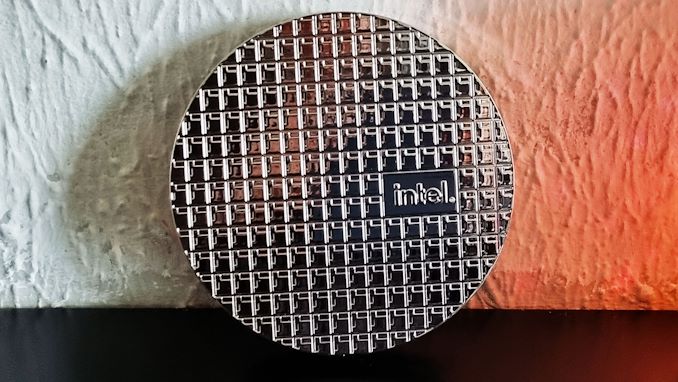
One slice of wafer or two? Core i9-13900KS inner packaging
Talking about its 12th Gen (Alder Lake) in particular, the launch of the Core i9-12900KS came around when AMD launched its X3D SKU, the Ryzen 7 5800X3D with 3D V-Cache packaging technology in a bid to counteract its favorability in gaming performance. The same could theoretically be said about the 6 GHz-laden Core i9-13900KS, as AMD's updated 7000 series X3D SKUs are expected very soon, and the launch dates seem to be aligned to counteract AMD once again. For reference, the Core i9-13900KS was officially launched on retail shelves earlier this month on the 12th Jan. AMD's Ryzen 7000 X3D series chips are due sometime in February.
So onto the meat and potatoes of our Core i9-13900KS review, the analysis. With ample time to test and learn specific characteristics of Intel's ultra-fast Core i9 13900KS processor, it has been a bit of a mixed bag. It was always going to be a chip of extremes thanks to clock speeds of 6 GHz, and upon first hearing about Intel's announcement to launch a 6 GHz SKU, my initial thought was shared by many; how is it going to be tamed when Intel's previous KS chips have notoriously been so hungry when it comes to power and temperatures?
Intel Core i9-13900KS Performance Analysis
Opening up our analysis with a little bit of background, Intel's Core i9-13900K (24-core 8P+16E) and AMD's Ryzen 9 7950X (16-core) are remarkably like a battle between cat and mouse; both chips are high quality, possess oodles of performance, and compete very closely when pushed to the limit.
Add the Core i9-13900KS to the mix, and it starts to tilt the deck to Intel's favor with its 6 GHz P-Core turbo clock speeds, higher all P-Core turbo, and higher P-core and E-core base frequencies. How much it improves on existing CPUs depends on the workload, the task, and the situation you put it in.
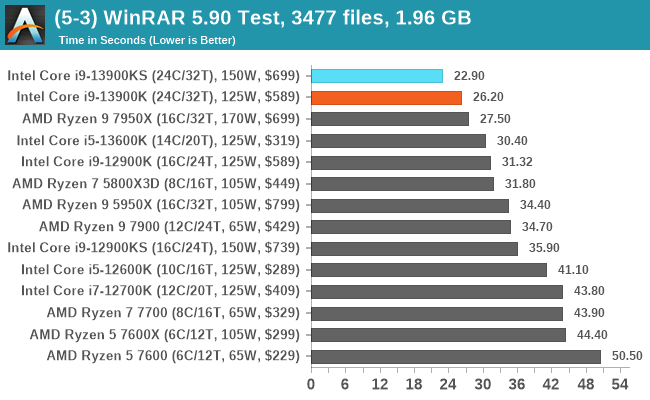
In our WinRAR 5.90 benchmark, the increased frequencies on the Core i9-13900KS yielded some good gains in performance, with a 3.3-second quicker encoding time compared to the Core i9-13900K. Comparing it to the AMD Ryzen 9 7950X, it encoded our 3477 files (1.96 GB) quicker by around 4.6 seconds. There are slight benefits to single-threaded performance through the higher P-core turbo clock speeds, but not enough to justify the additional cost in our testing, at least not from an apples-to-apples comparison.
From the rest of our benchmarks from our updated 2023 CPU suite, there wasn't much else to write home about for the Core i9-13900KS, as we saw marginal gains in rendering, encoding, simulation, and scientific-based workloads when compared to the 13900K; both competed very closely with each other throughout. The greatest gains from the 13900KS are going to be in lightly-threaded workloads where it can flex its muscles and properly hit 6.0GHz on up to 2 cores; so large, multi-threaded workloads don't benefit by quite as much.
That will most likely not be the summarization that users want to hear, but that's only half of the story, which I'll elaborate on further in our analysis.
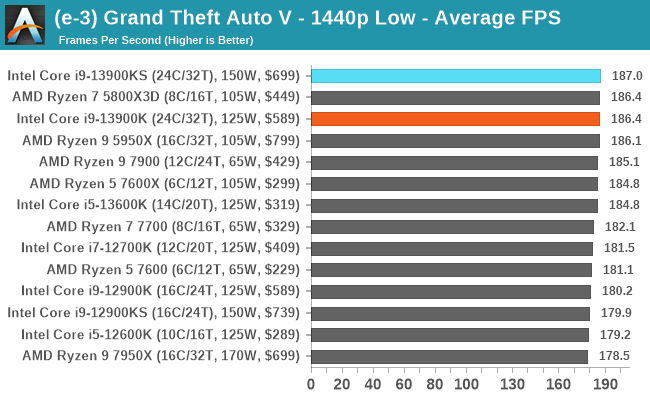
Touching a little on gaming performance, and as we expected to see, there wasn't much difference in our testing between the Core i9-13900KS and Core i9-13900K to pick a genuinely decisive winner. The 6 GHz Core i9-13900KS would come out on top in some games (marginally), and the Core i9-13900K would keep ahead. Perhaps the most interesting element from our games testing with our AMD Radeon RX 6950 XT graphics card was that in situations where the AMD Ryzen 7950X was ahead, the Core i9-13900KS didn't bridge the gap with its higher clocked cores.
Core i9-13900KS: 6 GHz, Power, and Thermal Analysis
As Intel is proud, and rightly so, of achieving a retail processor with clock speeds of 6 GHz out of the box, this isn't the entire story, and different narratives depend on requirements and how they are looked upon. The Core i9-13900KS is a 6 GHz processor, and from our testing, we have seen two of the eight P-Cores hit 6 GHz, so it must be a 6 GHz processor, right? Well, this is where things become interesting.
Looking at the core frequency data from a CineBench R23 Multi-Threaded test running on a loop for 5 minutes, we can see how the two defined 6 GHz boost P-cores behave. The two designated cores did indeed hit 6 GHz pretty much instantaneously, but within a couple of seconds of this, the heat became too much, and they quickly dropped to between 5.4 and 5.6 GHz along with the rest of the P-Cores.
The frequency constraints are down to thermal throttling, as Intel is using its Thermal Velocity Boost (TVB) to go from 5.8 to 6 GHz, but from our testing, this isn't sustained with the heavy thermal overhead required to keep things cool.
From the same CineBench R23 MT 5-minute loop test we ran, we can see the effect on both power and thermals. The Core i9-13900KS peaked at 360.2 W in power at its highest point around 18 seconds into the run, while die temperatures regularly hit the 100°C mark, which meant that thermal throttling was inevitable from the get-go; it only took 12-seconds for heat to become an issue, even with our premium EKWB 360 mm AIO CPU cooler. And from talking with other hardware reviewers, it's clear that we're not alone in seeing this.
The other interesting element is Intel's binning process, which should yield users with better silicon to overclock with compared to the Core i9-13900K. Xaver Amberger from IgorsLab has recently published some binning data from a wide selection of Core i9-13900K, Core i9-13900KF, and Core i9-13900KS samples with an ASUS ROG Maximus Z790 Hero motherboard using its SP value; a measure of determining how good the chip is for overclocking.
The consensus from their testing ties in with our thoughts that the Core i9-13900KS has a variably higher level of binning, thus giving users a higher chance of getting better silicon than opting for a Core i9-13900K model. From a consumer standpoint, unless a good custom water cooling loop is employed with the Core i9-13900KS, then the benefits of going for the higher bin special SKU over the regular Core i9-13900K aren't worth it.
Intel Core i9-13900KS: Fastest Desktop Processor, But Be Prepared To Spend $$$ on Cooling
It has been said many times that achieving peak performance levels is an expensive quest, and the Core i9-13900KS has a premium price of $729 (retail), while the Core i9-13900K is $600 at the time of writing. But that's not the whole picture...
There are benefits to be had from the Core i9-13900KS, and it is precisely what Intel claims it to be, the world's fastest desktop processor with core clock speeds of up to 6 GHz. This is prevalent in single-threaded applications, but once more than two cores are loaded, it reverts to the all-P-core frequency of 5.6 GHz; this is still very fast.
This is because Intel's Extreme Power Delivery Profile allows the chip to run at 320 W, giving more power headroom for the cores to do their thing. It's worth noting that Intel's integrated automatic overclocking technologies work well, including Turbo Boost Max 3.0, which is set to 5.8 GHz on two P-Cores. In contrast, Intel's Thermal Velocity Boost (TVB) technology allows the same two P-cores to push further to 6 GHz (200 MHz more) where thermals allow it.
Intel doesn't clarify that keeping temperatures in line so Thermal Velocity Boost can sustain 6 GHz does require superior cooling; CLC coolers will not do; custom water cooling is needed at a minimum for maximum performance. Of course, another avenue to reduce temperatures could be to under-volt the CPU V-Core slightly, although this isn't something novice users should consider, and the Core i9-13900KS with TBM 3.0 and TVB work well out of the box.
With their KS processors, Intel has seemingly abandoned any semblance of power and thermal efficiency and instead gone into the realms of max power and charge ahead at any cost territory. This makes purchasing the Core i9-13900KS heavily dependent on the system it will be installed into, including having ample cooling and power supply capabilities to let it stretch its legs. Pulling 360 Watts is no small amount of energy for the processor to contend with without factoring any of the above into the equation.
The Intel Core i9-13900KS is a feat of Intel's push to offer the fastest and, ultimately, best desktop processor on the market. Still, the $729 street price for marginal gains at best, even with a premium 360mm AIO CPU cooler, makes it hard to unequivocally recommend. That said, for users with deep pockets for a suitable chassis, a quality Z790 (or Z690) motherboard, and a premium custom water cooling loop, the Core i9-13900KS is the clear choice if you want to have the best of the best from Intel.


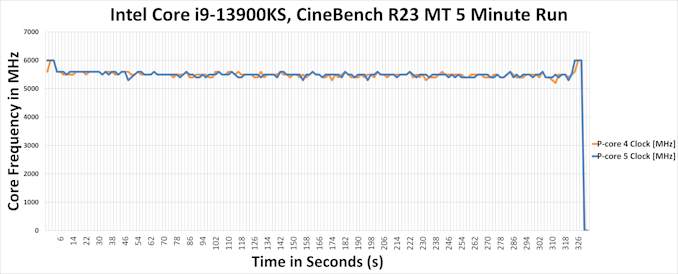
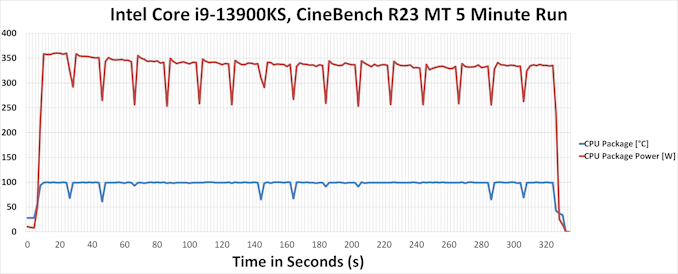









39 Comments
View All Comments
erinadreno - Friday, January 27, 2023 - link
No.nandnandnand - Friday, January 27, 2023 - link
Practically useless, even at 720p. Looking forward to 7000X3D.Kangal - Friday, January 27, 2023 - link
Sure, the i9-13900KS can be seen as "the best"......but it's hard to justify it for the real-world when there's the Intel Core i5-13600k right there! You're paying half the amount and using less power, to achieve a very impressive score right up there with the best.
I guess even more impressive is the AMD r7-7700 which trades blows with that chipset in performance, competitively price, uses significantly less power, and most importantly has a long support (AM5) period.
I wish we continue to see this trend, with the luxury products making it clear to show how good the mid-high range products have become. In some parts this is a correction in the market due to new competition. Consumers rejoice!
Andresen - Friday, January 27, 2023 - link
A very expensive and fast cpu is testet with some very slow memory. I don’t see the point in doing that. The slowest memory rated as DDR5-5600 in my local webshop is CL40 and the most commen is CL36 and I could choose CL28. CL46 is not an option. I’m not in the market for this cpu, but if I were I would combine it with DDR5-7200 at CL32. If memory overclocking is not an option, then I would use DDR5-5600 CL36.Makaveli - Friday, January 27, 2023 - link
Have to agree with you on this. No one buying this CPU is going to be pairing with the DDR5-5600 memory.Andresen - Monday, January 30, 2023 - link
I forgot to add, that apart from my minor critics regarding choice of memory, that it is nice that AnandTech makes these thorough reviews. I don’t think I can find such quality reviews anywhere else for pc-class hardware.Great_Scott - Wednesday, February 1, 2023 - link
The reviews are great, although I can't imagine there's a single hand-built Ryzen PC in existence that's using memory at JEDEC timings.It was interesting to see how the Ryzen 7950X was able to keep up in a large number of tests.
GeorgeV - Saturday, February 11, 2023 - link
Honestly, I wish these high end CPUs were tested at the speeds they can run 128GB of RAM at. From what I've seen around the web, these tested RAM speeds are higher than either can manage reliably when all 4 dimms are filled.jospoortvliet - Monday, February 13, 2023 - link
Well Andresen thinks it should be faster you think slower. I guess they did it right?DanNeely - Friday, January 27, 2023 - link
"*We changed the motherboard to the GIGABYTE Z690 Aorus Master as the MSI MPG Z790 Carbon WIFI we used for our previous 13th Gen Core series reviews refused to play ball. We don't like to make these changes lightly, but we weren't able to source another Carbon in time for this review"Did it fail outright, or still work for other chips but choke on this extra-power hungry one?